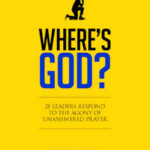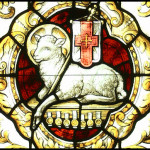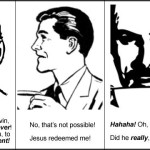We run our website the way we wished the whole internet worked: we provide high quality original content with no ads. We are funded solely by your direct support. Please consider supporting this project.

The Earth is a Spiritual Battlefield
The early Church Fathers uniformly believed that angels, like humans, were created free and given a sphere of influence and responsibility over creation. As with humans, angels could use this influence for good, as God intended, or they could choose to use it for evil. They understood that this is simply what it means for God to have given us free will. The earliest fathers thus believed that, just as God had given humans “say-so” over the earth, which we could use for better or for worse, so God gave “say-so” over aspects of the cosmos, and to some degree over humans, to angels.
For example, Athenagorus argued that “the Maker and Framer of the world distributed and appointed … a multitude of angels and ministers … to occupy themselves about the elements, and the heavens, and the world, and the things in it, and the godly ordering of them all.” Then he adds,
“Just as with men, who have freedom of choice as to both virtue and vice … so is it among the angels. Some, free agents, you will observe, such as they were created by God, continued in those things for which God had made and over which He had ordained them; but some outraged both the constitution of their nature and the government entrusted to them” (A Plea For the Christians, 10).
So too, Origen held that every aspect of nature was under the care of “invisible husbandmen and guardians” (Against Celsus, 8.31). St. Gregory at a later date reiterates the prevailing view of the early church when he says, “In this visible world … nothing can be achieved except through invisible forces” (Dialogues, IV.5).
“Natural” evil was consistently explained in the early church as resulting from these spirits rebelling against God and thus abusing their authority over creation. Hence, for example, Origen argued that famines, scorching winds and pestilence were not “natural” in God’s creation; they were rather the result of fallen angels bringing misery whenever and however they were able (Against Celsus, 8.31). These rebel guardians were also “the cause of plagues…barrenness…tempests… [and] similar calamities” (Against Celsus, 1.31).
So too, Tertullian argued that “[d]iseases and other grievous calamities” were the result of demons whose “great business is the ruin of mankind.” When “poison in the breeze blights the apples and the grain while in the flower, or kills them in the bud, or destroys them when they have reached maturity …” one can discern the work of these rebellious guardian spirits (Apology 22). For Tertullian, as for Origen and Athenagorus (and we could add Tatian, Justin Martyr, Clement of Alexandria and others), creation doesn’t consistently reflect the beauty of its Creator because it has been, and is being, corrupted by demonic forces.
Following the teachings of the New Testament, these early theologians all understood that the leader of the rebel army that ravaged nature was Satan. In the words of Athenagorus, Satan was “the spirit” originally entrusted with “the control of matter and the forms of matter” (A Plea, 24). The entire material creation was to be administrated by this highest-ranking angel, according to this theologian.
Unfortunately, this “spirit” used its free will to rebel against God. He now exercises his tremendous authority over material creation against God. He abuses “the government entrusted to [him].” Given the nature of moral responsibility, God could not simply revoke Satan’s sphere of influence. Hence, Athenagorus argued, “the prince of matter exercises a control and management contrary to the good that is in God” (A Plea, 25).
Reflecting the basic vision of the early Church, Athenagorus concluded that everything in nature that obviously looks contrary to God’s character appears that way because it is contrary to God. It didn’t arise from the omni-benevolent hand of the Creator (as the atheists of his day and ours object) but was rather due to the activity of an evil “ruling prince” and “the demons his followers” (A Plea, 25).
Much more could be said about this, but I hope this suffices to show that the early church fathers all saw creation as a war torn battlefield. It had been corrupted to its very core. And this is why nature is violent, both toward animals and people. I don’t believe this view would have arisen in the church were the foundation for it not laid in the apostolic tradition. These early fathers are simply working out the implications of the biblical view that Satan is the “lord of the earth,” the “ruler of the air” and the “god of this age” who “controls the entire world.”
And if you ask me, they were on the right track.
So when a hurricane wipes out an entire village or an earthquake massacres thousands of people; next time you consider the millions dying from AIDS or the millions tortured by parasites; next time you hear about the millions suffering from drought and famine, or consider the untold pain of millions suffering and dying from any number of other diseases, don’t say “This is the work of God.”
Say rather, “An Enemy has done this” (Mt 13:28).
Image by Zoriah via Flickr.
Category: General
Tags: Church Fathers, Evil, Free Will, Satan, Spiritual Warfare
Topics: Spiritual Warfare, Cosmic Conflict
Related Reading

Free Will in the Bible
Scripture portrays humans as having minds and wills of their own. They are, in a real (though limited) sense, creators of their own behavior and determiners of their own destinies—whether this behavior and destiny is in line with God’s will or not. This fundamental assumption is demonstrated in a variety of ways throughout Scripture. It…

Were the Consequences for Adam & Eve’s Choice Fair?
In this episode Greg ponders Adam and Eve’s choice and the enormous consequences of that seeming arbitrary decision. Links: Greg’s book: “God at War“ http://traffic.libsyn.com/askgregboyd/Episode_0021.mp3

When Prayers Go Unanswered
Recently Frank Viola published a free e-book where 21 Christian leaders responded to the following question: Why is it that God doesn’t often answer the desperate prayers of His people for deliverance, protection, healing, etc.? You can download the free ebook by clicking here. The following excerpt is Greg’s contribution to this book: _____________________ Two very ill children are…

What does the Bible mean when it says God “sent an evil spirit” on certain people?
Question: In Judges 9:23, I Samuel 16:15ff and 18:10 it is said that God sends evil spirits on people. Doesn’t this support the idea that everything Satan and demons do is under God’s sovereign control? Answer: I’ll make six points in response to this question. 1) If everything Satan and demons do is under “God’s…

God’s Kind of Holy War
This is part three of a series on Revelation. You can find part one here and part two here. While there will come a day when the sacrificial victory of the Lamb and of his people will be apparent to all (5:13; 15:4; 21: 23-4), only to those who embrace the perspective of the heavenly…

